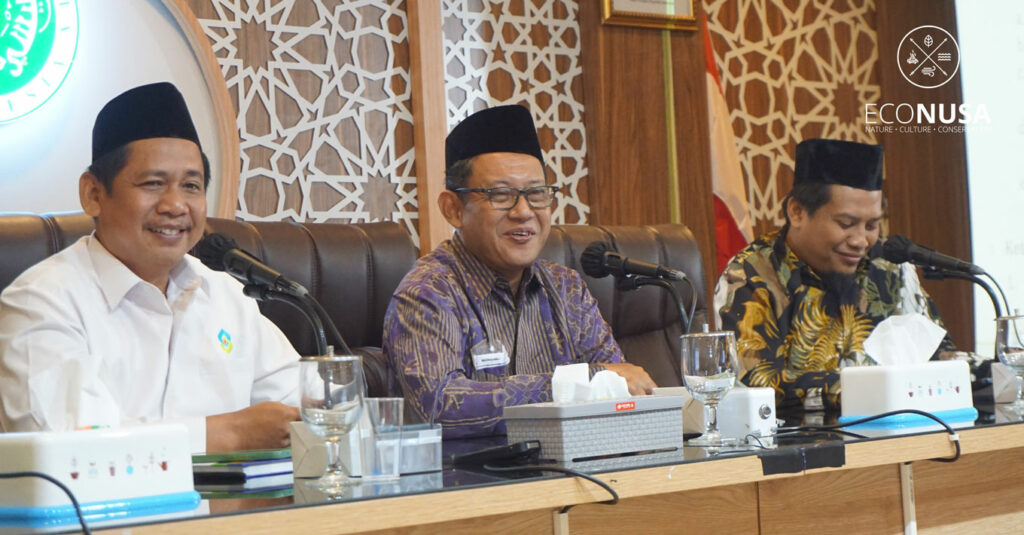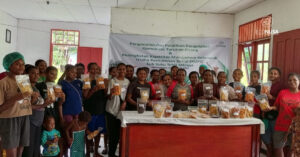
The Majelis Ulama Indonesia (MUI), also known as the Ulama Council of Indonesia, has declared that all actions leading to environmental damage and contributing to the climate crisis are considered haram. This proclamation is outlined in the Fatwa MUI Number 86/2023 on The Law for Controlling Global Climate Change, officially launched on Friday, 23 February 2024. “Uncontrolled deforestation and forest burning that disrupt natural ecosystems, leading to significant releases of greenhouse gasses and diminishing the Earth’s capacity to absorb and store carbon, are also deemed haram,” stated Miftahul Huda, the Secretary of the MUI Fatwa Commission.
According to Miftah, in recent decades, numerous natural phenomena have posed threats to the Earth and the sustainability of its inhabitants, including humans. Some of these natural occurrences encompass tropical storms, intense wildfires, droughts causing shifts in planting seasons, the melting of ice in the Arctic, and rising sea levels resulting in the submersion of many lands. “In Demak, many villages have disappeared; Jakarta has experienced flood waters several times, and in Kuala Enok in Indragiri Hilir, many coconut plantations have submerged, even though they were once relied upon,” he said.
Miftah stated that all of these are consequences of climate change. In an effort to address this, MUI issued a fatwa on controlling climate change, allowing the Indonesian nation to participate in mitigation and adaptation.
Read Also: Coastal Communities Amidst Poverty, Mining, and Global Warming
Hayu Prabowo, the Chairman of the Environment and Natural Resources Body of MUI, added that the fatwa aims to change the behavior of the people. “We know that climate change is occurring due to human behavior that is extractive in daily life and the use of fossil fuels,” he said.
In this fatwa, MUI calls on all parties to contribute to mitigation and adaptation efforts to climate change, reduce carbon footprint that are not basic needs, and undertake the energy transition. MUI also provides recommendations to the central government, local government, education institutions, business actors, religion leaders, civil society, and legislative. One of these recommendations is to accelerate the formation of laws related to climate change by following the principles of climate justice.
The MUI Fatwa on the Law for Controlling Global Climate Change is a proposal from EcoNusa Foundation, Manka, Interfaith Rainforest Initiative (IRI), and Ummah4Earth. Juliarta Bramansa Ottay, Director of Manka Association, stated that the submission was motivated by concern from the proposal organizations. The concern arises because the issue of climate change has not yet been incorporated into all sectors, even though it is extremely important. “This fatwa is a collective victory as the issue of climate change has been recognized as a fundamental matter for common norms, even issued as a fatwa by MUI,” he said.
Read Also: Climate Change and Its Impact on Earthquakes
With collaboration from all parties, Juliarta hopes that in the future climate change will not have excessive impacts, allowing people to live comfortably, especially for small communities that are most vulnerable to climate change.
Cindy Simangunsong, Policy and Advocacy Manager of EcoNusa said that this fatwa gives the confirmation that religion also mandates every adherents to well behave, mitigating to maintain behavior to preserve the environment. “With the majority of our citizens being Muslim, it is hoped that this Fatwa can impact behavioral changes and encourage a larger movement in controlling climate change,” she said.
The Secretary of the Director Climate Change of the Ministry of Environment and Forestry, Agus Rusly, welcomed the fatwa. According to him, this could serve as guidance and reference for the government. “Not only for the Ministry of Environment and Forestry, but also for other ministries and agencies involved in environmental management,” he said.
The Head of the Permanent Committee of Solid Waste, Hazardous Waste, and Hazardous Substances, at the Indonesian Chamber of Commerce and Industry, Basrie Kamba, mentioned that his agency also implements several mitigation and adaptation measures. This is mainly because many requests for Indonesian products from abroad require sustainable business practices. “Mitigation and control of climate change for us are not options because this is the way if we want to see a healthy, peaceful, and sustainable business,” he claimed.
Editor: Cindy Simangunsong & April Sirait




